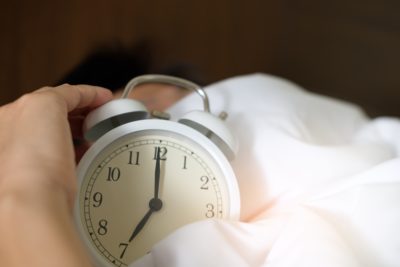How your thyroid affects sleep

You toss. You turn. The glowing 2:00 a.m. on your alarm clock glares and taunts. Still, you just can’t sleep. Sound familiar? If so, welcome to the world of being wired and tired.
While everyone may have trouble falling asleep occasionally (especially before a big deadline or after one too many shots of afternoon espresso), a pattern of insomnia is a big problem.
Find how your thyroid may be contributing to your sleepless nights and learn the top 6 supplements for sleep.
There are a few ways your thyroid may be affecting your ability to catch some z’s.
Your thyroid sits at the control station for the metabolic functions of nearly every cell in your body. This means that your thyroid imbalance is playing a role in the factors leading to insomnia.
1. Too much thyroid hormone affects sleep
First, too much thyroid hormone can cause anxiety, increased heart rate and insomnia. If you’re experiencing these symptoms while taking thyroid hormone to treat your hypothyroidism, check your dose. It might be too high, causing hyperthyroid symptoms.
2. Too little thyroid hormone affects sleep
Similarly, an underactive thyroid can contribute to sleep problems. Just like low thyroid hormones can make your tired and drag throughout the day, hypothyroidism can keep you from getting the refreshing sleep your body craves at night. Also, hypothyroidism can increase the risk of sleep apnea and obesity which can also play a role in insomnia.[1]
3. Your thyroid affects sex hormones needed for sleep
Next, your thyroid plays a role in the sex hormones needed for quality sleep. Got hypothyroidism? Then your sex hormone levels may be dropping, which can cause sleep difficulties. Combine an underactive thyroid with decreasing estrogen and progesterone levels in menopause, and you’ve double trouble.
Estrogen and progesterone are both needed for good sleep. First, the female brain uses estrogen to keep anxiety at bay. Lack of estrogen can cause hot flashes. If you find yourself abruptly throwing off the comforter in the middle of the night, thank your falling estrogen levels.
Next, progesterone is the calming hormone. It produces the neurotransmitter GABA. Having the right amount of GABA allows you to keep your cool under pressure. A progesterone deficiency could be the reason why you’re tossing and turning all night long.
4. Your thyroid and cortisol balance affect sleep
In addition, your thyroid hormones and cortisol could be affecting your sleep. Your thyroid and adrenal glands are a dynamic duo. When one is out of balance, the other can be, as well. Your adrenals produce the stress hormone cortisol. Usually, your body produces cortisol in the morning and it gradually tapers throughout the day. However, an imbalance in adrenals could mean cortisol is telling your body to rise and shine, even if it’s only 2 a.m.
One in four women report insomnia-related symptoms.[2] Women, especially those with type A personalities, are more common than men to deal with insomnia and stress. If you find yourself rehearsing stressful conversations of the day or your a seemingly never-ending to-do list as soon as your head hits the pillow, you’re activating your HPA axis. This means more night-waking and lesser amounts of restorative sleep.
5. Low blood sugar affects sleep
Hypoglycemia, or low blood sugar, is another cause of sleep problems. Researchers continue to study the link between hypothyroidism and hypoglycemia.[3]
Nauseous or not hungry at breakfast? Waking up in a panic in the middle of the night? These could be a signs of low blood sugar. Your body raises cortisol to release glucose to stabilize blood sugar and keep your body humming along. The rise in cortisol, however, can jolt you from your dreams.
Low blood sugar tip: Find yourself waking between 2:30 and 4:00 a.m.? Try a snack rich in protein and good fats right before bed. Almond butter, hard-boiled eggs or nuts could work. Still waking? Keep a handful of almonds near the bed to eat as soon as you are awakened. This way, you don’t even have to turn on the light and you have a greater chance of being able to fall back to sleep.
Curious how else your thyroid may be affecting your health? Download a free copy of my ebook highlighting 25 powerful thyroid truths.
6. Other conditions that can affect sleep
It’s important to get to the root cause of your sleep issues. Less-than-stellar thyroid function as well as parasites, leaky gut and an imbalance in neurotransmitters can all affect sleep.
The good news is that functional medicine gets to the root of your insomnia to restore body balance and make lasting changes. Hooray!
Top 6 supplements for sleep
Supplementation can be part of how we restore your body’s balance. If you have trouble catching decent shut-eye, these 6 supplements could help you get back to sleep.
Combine these with proper sleep hygiene before bed to guide to your body to dreamland.
1. Taurine
Taurine might be dubbed “the lost lost amino acid.” Unlike other amino acids, taurine does not build protein. However, it supports the body in other ways such as in hydration and mineral regulation.
Even though it doesn’t get a lot of attention, taurine is perfect for sleep-support. It plays a positive role in calming the nerves. Taurine decreases anxiety and has been used to help those with seizures. The best part about taurine? It won’t make you sleepy during the day.
2. L-Theanine
An extract of green tea, L-theanine can promote a feeling of quite, focused calm without drowsiness. Sensitive to caffeine? No worries, you won’t find any here. L-theanine has been studied for its calming effects on anxiety. Note, L-theanine will reduce the effects of blood pressure medications.
3. Magnesium
Over 300 biochemical pathways in your body rely upon magnesium.[4] It plays a role in the production of sleep-inducing melatonin and helps you relax.[5] Magnesium glycinate doesn’t cause loose stools the way magnesium citrate can.
4. Melatonin
Naturally high in the morning and falling at night, melatonin tells your body it’s time to sleep. Your body produces it naturally from 9:00 p.m. to around midnight. So, the old saying “Early to bed, early to rise makes a man healthy, wealthy and wise” might be right. Melatonin has successfully been used to promote sleep in several studies.[6] Taking 3 mg before bed may help you fall and stay asleep.
Please be aware that those with autoimmune issues or lymphatic cancers may find melatonin cause depression. This isn’t a concern in those with just hypothyroidism, but those with Hashimoto’s should be aware.
5. Inositol
Inositol is a vitamin-like substance found in plants and animals. Promoting clarity of thought and restful sleep, inositol might help you get more z’s while also supporting your brain and blood sugar control. Healthy serotonin levels require inositol. Inositol can be beneficial to those with depression, anxiety and OCD. Insulin is positively influenced by inositol, too.[7]
6. Valerian root
Valerian root can be calming to the brain and nerves. In a randomized clinical controlled trial, valerian root significantly improved the quality of sleep in postmenopausal women.[8]
Choose supplements wisely
When choosing supplements, it’s best to opt for sprays, drops, liqupids, powders and capsules. Skip formulations made with tablets since they can be harder to break down and utilized by the body.
Ready to get to the root of your insomnia and get a customized treatment plan? Schedule a free 30 min. consult today. Get to the root cause of your health woes and banish insomnia and unpleasant symptoms for good.
Sources
- [1] “Role of hypothyroidism in obstructive sleep apnea: a meta … – NCBI.” 24 Mar. 2016, https://www.ncbi.nlm.nih.gov/pubmed/26907534. Accessed 4 May. 2019.
- [2] “Insomnia and the performance of US workers: results from the … – NCBI.” 1 Sep. 2011, https://www.ncbi.nlm.nih.gov/pubmed/21886353. Accessed 4 May. 2019.
- [3] “The hypoglycemic side of hypothyroidism – NCBI.” https://www.ncbi.nlm.nih.gov/pmc/articles/PMC3968713/. Accessed 4 May. 2019.
- [4] “Magnesium — Health Professional Fact Sheet.” 26 Sep. 2018, https://ods.od.nih.gov/factsheets/Magnesium-HealthProfessional/. Accessed 4 May. 2019.
- [5] “Biorhythms and possible central regulation of magnesium … – NCBI.” https://www.ncbi.nlm.nih.gov/pubmed/12030424. Accessed 4 May. 2019.
- [6] “The effectiveness of melatonin for promoting healthy sleep – NCBI – NIH.” 7 Nov. 2014, https://www.ncbi.nlm.nih.gov/pmc/articles/PMC4273450/. Accessed 4 May. 2019.
- [7] “D-Chiro-Inositol – Its Functional Role in Insulin Action … – NCBI – NIH.” https://www.ncbi.nlm.nih.gov/pmc/articles/PMC2478565/. Accessed 4 May. 2019.
- [8] “Effect of valerian on sleep quality in postmenopausal women: a … – NCBI.” https://www.ncbi.nlm.nih.gov/pubmed/21775910. Accessed 4 May. 2019.





